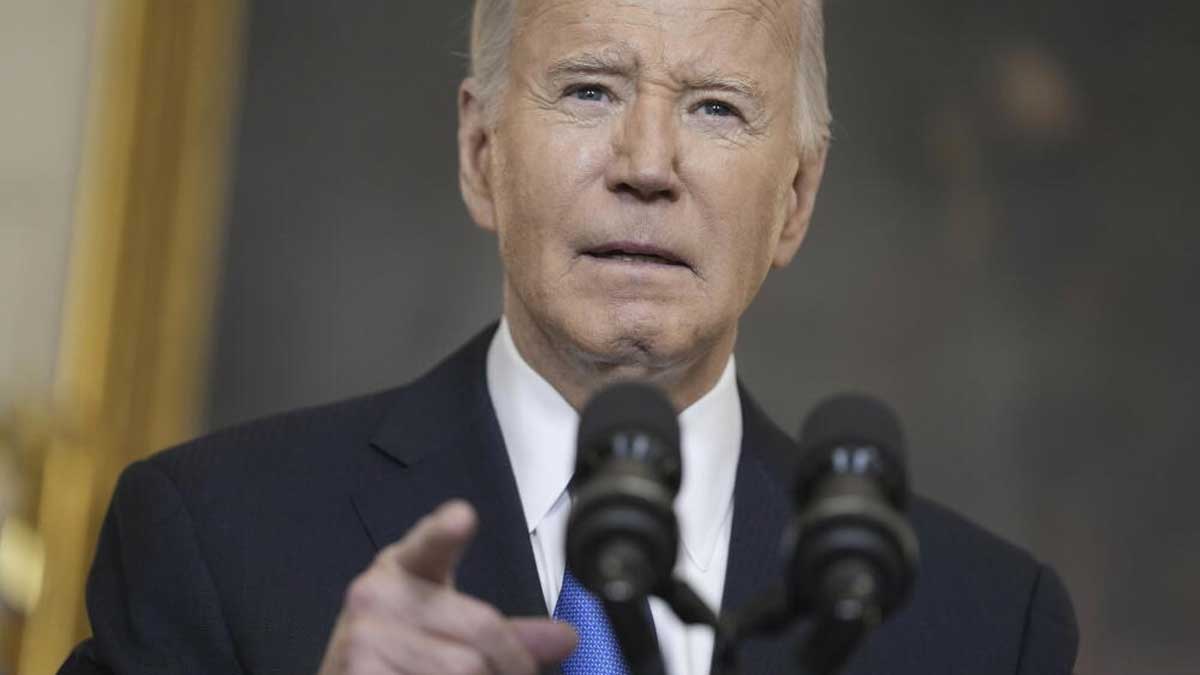- Home
- Billionaires
- Investing Newsletters
- 193CC 1000
- Article Layout 2
- Article Layout 3
- Article Layout 4
- Article Layout 5
- Article Layout 6
- Article Layout 7
- Article Layout 8
- Article Layout 9
- Article Layout 10
- Article Layout 11
- Article Layout 12
- Article Layout 13
- Article Layout 14
- Article Sidebar
- Post Format
- pages
- Archive Layouts
- Post Gallery
- Post Video Background
- Post Review
- Sponsored Post
- Leadership
- Business
- Money
- Small Business
- Innovation
- Shop
Recent Posts
Top Democrats Seek Biden’s Exit, Eye Potential Replacements

In the wake of a shaky performance in the June 27 debate and subsequent polling data indicating a substantial lead for former President Donald Trump, top Democratic leaders are reportedly urging President Joe Biden to consider withdrawing from the 2024 presidential race. Senate Majority Leader Chuck Schumer, House Minority Leader Hakeem Jeffries, and former House Speaker Nancy Pelosi have all privately expressed concerns about Biden’s ability to secure a victory, according to sources familiar with the discussions cited by ABC News. These conversations highlight the increasing anxiety within the Democratic Party about Biden’s electability, given the recent polling trends.
These concerns are underscored by a series of recent polls showing a significant shift in voter sentiment. Notably, a survey conducted by the Associated Press-NORC revealed that 65% of Democrats believe the party should nominate someone other than Biden. This poll is particularly damning, reflecting a broader dissatisfaction among the party’s base. Despite these alarming numbers, none of the mentioned Democratic leaders have publicly denied the reports of their behind-the-scenes conversations, adding fuel to the speculation about Biden’s potential withdrawal. The growing consensus among these influential Democrats suggests a strategic move might be necessary to strengthen the party’s chances in the 2024 election.
Initially steadfast in his decision to remain in the race, Biden is reportedly becoming more receptive to the idea of stepping down. According to reports from The New York Times, Biden has started engaging in discussions about negative poll results and their implications. CNN further reported that Biden has sought advice from his advisors regarding Vice President Kamala Harris’s viability as a presidential candidate against Trump. Harris, with her national name recognition and established position on the ticket, is viewed as a leading contender to replace Biden. Her ability to seamlessly take over Biden’s campaign resources is seen as a significant advantage. This shift in Biden’s stance marks a notable change in the campaign’s dynamics, reflecting the mounting pressure he faces.
California Governor Gavin Newsom has also been a subject of speculation. His political activities, including support for Democrats beyond California, had previously fueled rumors of a possible presidential run. However, Newsom has publicly denied any intention of running, reiterating his commitment to Biden’s 2024 campaign. Other Democratic governors, such as Illinois’ J.B. Pritzker, Michigan’s Gretchen Whitmer, Colorado’s Jared Polis, and Pennsylvania’s Josh Shapiro, have similarly been mentioned as potential candidates. Each of these governors has elevated their national profiles and achieved decisive electoral victories in 2022, but they continue to support Biden’s campaign and defend his candidacy. Their unified stance underscores a commitment to party solidarity, despite the underlying concerns about Biden’s performance.
Senator Bernie Sanders, who is a year older than Biden, had not ruled out a 2024 presidential run in the event of an open primary. However, Sanders has consistently defended Biden’s decision to stay in the race. In a 2022 memo, an advisor to Sanders suggested that the senator might consider running if Biden stepped down, but Sanders has since urged Democrats to unite behind Biden. In a July 13 New York Times op-ed titled “Joe Biden for President,” Sanders called for an end to intra-party bickering and emphasized the importance of focusing on defeating Trump. Sanders’ support for Biden highlights the complexities within the Democratic Party, as it navigates the challenges of the upcoming election.
Former Democratic presidential candidates Pete Buttigieg, Cory Booker, and Amy Klobuchar are also mentioned as possible replacements for Biden. Buttigieg, currently serving as Transportation Secretary, and Senators Booker and Klobuchar have not shown interest in running against Biden. Booker has publicly defended Biden, while Klobuchar has expressed concerns about the future of his candidacy but has not indicated a desire to run herself. The inclusion of these names in the discussions reflects the breadth of potential candidates within the party, each with their own strengths and national recognition.
Representative Dean Phillips of Minnesota, who challenged Biden in the primary largely focusing on Biden’s age, dropped out after receiving minimal support. Phillips’ campaign highlighted the concerns about Biden’s age and ability to serve another term, but his lack of traction suggests that the party base is still largely aligned with Biden. Phillips’ challenge, though unsuccessful, adds to the narrative of an internal debate within the party about the best path forward.
There are speculative theories about Michelle Obama being a potential nominee, but she has repeatedly stated she does not intend to run for president. Despite her high favorability ratings and widespread popularity, Obama has consistently dismissed any notion of a political bid. The persistent rumors about her candidacy underscore the party’s search for a unifying and popular figure, but Obama’s clear disinterest puts those theories to rest. Her continued popularity, however, remains a significant asset for the Democratic Party.
Biden, who secured the Democratic nomination this year, could theoretically step aside at the Democratic National Convention, allowing delegates to choose a new nominee. If Biden were to step down, delegates could support another candidate, given that they are not required to back the nominee at the convention. In the unlikely event that Biden wins the nomination but cannot run in the general election, Democratic Party Chair Jaime Harrison would consult Congress and the Democratic Governors Association to recommend a new nominee to the Democratic National Committee. This process underscores the flexibility within the party’s nomination procedures, ensuring a contingency plan is in place.
Biden’s debate performance on June 27, characterized by lost trains of thought and incoherent answers, has intensified discussions about replacing him. During the debate, Biden struggled to respond coherently and had to correct himself multiple times, speaking with a hoarse voice and often appearing disengaged. His performance reportedly sent the Democratic Party into a panic, with operatives, lawmakers, and donors privately discussing the possibility of replacing him on the ticket. In the weeks following the debate, 20 Democratic lawmakers have publicly called for Biden to step down, but he has vowed to remain in the race, attributing his performance to a cold, his travel schedule, and what he described as Trump’s “lies” during the debate. This episode has heightened the urgency within the party to address Biden’s candidacy.
Third-party candidates like Robert F. Kennedy Jr. and Cornel West, while not seen as viable, could gain attention if Biden exits the race. Kennedy, running as an independent, and West, known for his progressive stances, may see an opportunity to galvanize support if the Democratic primary opens up. Although neither is considered a serious threat to the Democratic nominee, their presence could influence the dynamics of the race and appeal to specific voter segments disillusioned with the current choices.
Recent Posts
Categories
- 193 Countries Consortium Partner1
- 193cc Digital Assets2
- 5G1
- Aerospace & Defense48
- AI37
- Arts3
- Banking & Insurance11
- Big Data3
- Billionaires1,021
- Boats & Planes1
- Business332
- Careers13
- Cars & Bikes79
- CEO Network1
- CFO Network17
- CHRO Network1
- CIO Network1
- Cloud10
- CMO Network18
- Commercial Real Estate7
- Consultant1
- Consumer Tech194
- CxO1
- Cybersecurity73
- Dining1
- Diversity, Equity & Inclusion4
- Education7
- Energy8
- Enterprise Tech29
- Events11
- Fintech1
- Food & Drink2
- Franchises1
- Freelance1
- Future Of Work2
- Games149
- GIG1
- Healthcare79
- Hollywood & Entertainment203
- Houses1
- India’s 1000 Richest1
- Innovation46
- Investing2
- Investing Newsletters4
- Leadership65
- Lifestyle11
- Manufacturing1
- Markets20
- Media195
- Mobile phone1
- Money13
- Personal Finance2
- Policy569
- Real Estate1
- Research6
- Retail1
- Retirement1
- Small Business1
- SportsMoney42
- Style & Beauty1
- Success Income1
- Taxes2
- Travel10
- Uncategorized12
- Vices1
- Watches & Jewelry2
- world's billionaires989
- Worlds Richest Self-Made Women3
Related Articles
South Korea Plane Crash: A Tragic Loss and Global Mourning
The tragic plane crash at South Korea’s Muan International Airport on Sunday...
By 193cc Agency CouncilDecember 30, 2024H-1B Visa Debate Splits Trump Allies and Silicon Valley
The debate over H-1B visas has once again become a contentious issue,...
By 193cc Agency CouncilDecember 28, 2024Trump Moves $4B Stake in Truth Social Parent, Stock Drops 6%
Donald Trump recently transferred his 57% stake in Trump Media & Technology...
By 193cc Agency CouncilDecember 20, 2024House Rejects Trump-Backed Funding Bill, Shutdown Looms
The U.S. House of Representatives rejected a new government funding bill on...
By 193cc Agency CouncilDecember 20, 2024















Leave a comment